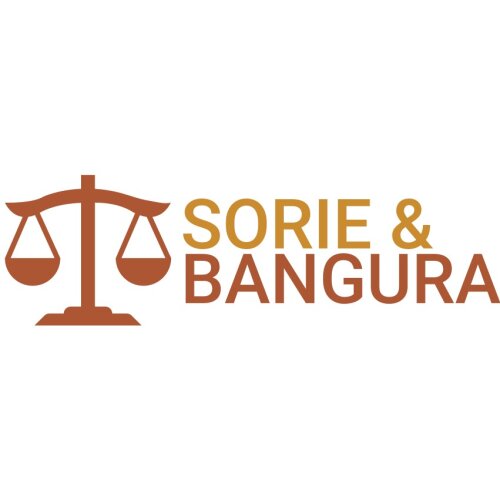Best ESG Advisory & Compliance Lawyers in Sierra Leone
Share your needs with us, get contacted by law firms.
Free. Takes 2 min.
Or refine your search by selecting a city:
List of the best lawyers in Sierra Leone
About ESG Advisory & Compliance Law in Sierra Leone
Environmental, Social, and Governance (ESG) Advisory and Compliance law in Sierra Leone is an emerging area of legal practice that helps businesses align their operations with international sustainability standards and local legal requirements. ESG compliance refers to a company’s efforts to operate ethically, to protect the environment, respect social responsibilities, and maintain transparent governance. In Sierra Leone, rapid investment and development, especially in mining, agriculture, and infrastructure, have increased the importance of ESG compliance for both local and foreign companies. Regulatory bodies are focusing more on sustainability and ethical conduct, making ESG advisory services essential for companies seeking to manage risks, maintain good reputations, and ensure long-term business success.
Why You May Need a Lawyer
There are several situations where legal help in ESG advisory and compliance becomes critical in Sierra Leone. Some common scenarios include:
- Companies establishing new operations in sectors like mining, agriculture, or infrastructure that require environmental permits or social impact assessments. - Businesses involved in mergers or acquisitions seeking to assess ESG risks and opportunities. - Investors and stakeholders requiring assurance that a company complies with local and international ESG standards. - Cases where companies face allegations or investigations related to environmental pollution, human rights abuses, or governance issues. - Navigating sector-specific requirements, such as those for extractive industries or public projects, where compliance involves multiple regulatory bodies. - Drafting and reviewing policies, contracts, and disclosures related to ESG performance. - Resolving disputes involving land rights, community impact, or environmental harm. - Implementing sustainable business practices in line with global frameworks such as the UN Sustainable Development Goals or the Equator Principles.
Local Laws Overview
Sierra Leone has several key legal frameworks and regulatory bodies governing ESG matters:
- Environmental Legal Framework: The Environmental Protection Agency Act 2008 gives the Environmental Protection Agency (EPA-SL) authority to regulate projects for their environmental impacts. Mandatory Environmental Impact Assessments apply to many business activities. - Labour and Social Laws: The Employers and Employed Act 1960, augmented by international conventions ratified by Sierra Leone, sets minimum labor standards and protects workers' rights. - Corporate Governance: The Companies Act 2009 governs business operations, transparency, and reporting obligations, requiring robust governance structures. - Human Rights and Community Engagement: The Constitution and sector-specific regulations address land rights, community consultation, and the protection of vulnerable groups. - Industry-Specific Regulations: The Mines and Minerals Act 2009 and Petroleum (Exploration and Production) Act 2011 impose specific ESG requirements on extractive industries, including environmental management and community benefit obligations. - Anti-Corruption Laws: The Anti-Corruption Act 2008 aims to promote transparency and ethical conduct in public and private sector dealings.
Compliance with these laws is monitored by bodies such as the EPA-SL, Ministry of Labour and Social Security, and Anti-Corruption Commission. Legal requirements may evolve as Sierra Leone moves toward stronger alignment with international ESG standards.
Frequently Asked Questions
What does ESG mean in the context of Sierra Leone?
ESG refers to Environmental, Social, and Governance principles. In Sierra Leone, this relates to a business’s responsibility to operate sustainably, respect local communities, and maintain transparent corporate structures in compliance with both local and international standards.
Is ESG compliance mandatory for all companies?
Some aspects of ESG compliance, such as environmental assessments or labor standards, are mandatory for most companies, especially in regulated sectors like mining or infrastructure. Other ESG components are encouraged but may not be legally required unless specified by contract or regulation.
What are common ESG risks for businesses in Sierra Leone?
Common risks include environmental damage, non-compliance with labor laws, failure to consult with communities, lack of transparency, and exposure to corruption. Failure to address these risks can result in penalties, loss of licenses, or legal disputes.
How can a lawyer assist with ESG matters?
A lawyer can help interpret and navigate complex ESG regulations, draft compliance policies, guide company disclosures, conduct due diligence, represent clients before regulatory agencies, and defend against enforcement actions or litigation.
Are there international ESG frameworks applicable in Sierra Leone?
Yes, international frameworks like the UN Sustainable Development Goals, Equator Principles, and International Finance Corporation Performance Standards are often used as benchmarks, especially for international investors or lenders.
What is an Environmental Impact Assessment (EIA) and when is it required?
An EIA is a formal process assessing the potential environmental consequences of a project. In Sierra Leone, EIAs are required by law for most significant projects in sectors like mining, energy, and large-scale agriculture.
How do community rights influence ESG compliance?
Companies must respect statutory land and resource rights, consult with communities, and often provide social benefits. Disregarding these obligations can result in legal challenges or project delays.
Can non-compliance with ESG obligations result in sanctions?
Yes, sanctions can include fines, suspension of business licenses, project shutdown, or even criminal liability in instances of serious misconduct or environmental damage.
Does ESG law apply to foreign investors in Sierra Leone?
Foreign investors are subject to the same ESG-related laws and regulations as domestic companies. In fact, their contracts and funding agreements may impose even stricter ESG obligations.
How can companies show they comply with ESG requirements?
Companies typically demonstrate compliance through documented policies, reports, mandatory permit approvals, external audits, and stakeholder engagement processes, all of which can be reviewed by authorities or third parties.
Additional Resources
If you require more information or assistance regarding ESG Advisory and Compliance in Sierra Leone, you may consider the following resources:
- Environmental Protection Agency Sierra Leone (EPA-SL): The primary authority on environmental compliance and impact assessment. - Ministry of Labour and Social Security: For information on labor laws and workplace standards. - Anti-Corruption Commission: For guidelines on ethical business conduct. - Sierra Leone Chamber of Commerce, Industry and Agriculture: Business support and guidance on governance standards. - Local law firms or legal clinics with expertise in ESG advisory and corporate compliance. - International organizations such as the United Nations Development Programme and the World Bank, which have active ESG-related projects in Sierra Leone.
Next Steps
If you believe you need help with an ESG Advisory and Compliance matter in Sierra Leone, it is advised to:
1. Identify the specific ESG issue your business faces and gather relevant documents or records. 2. Reach out to a lawyer or firm with experience in ESG advisory and compliance in Sierra Leone. They will be able to assess your situation, advise on relevant obligations, and help design compliance strategies. 3. If your matter involves a regulatory agency, act promptly to request information or submit required applications. 4. Consider undertaking voluntary ESG reviews or risk assessments if you are preparing for investment or expansion. 5. Stay informed about changes in local laws that could affect your obligations. 6. Participate in relevant training or information sessions offered by government or professional bodies. Taking these steps early can help you avoid costly disputes, protect your business reputation, and ensure you operate within the law while achieving sustainable business growth.
Lawzana helps you find the best lawyers and law firms in Sierra Leone through a curated and pre-screened list of qualified legal professionals. Our platform offers rankings and detailed profiles of attorneys and law firms, allowing you to compare based on practice areas, including ESG Advisory & Compliance, experience, and client feedback.
Each profile includes a description of the firm's areas of practice, client reviews, team members and partners, year of establishment, spoken languages, office locations, contact information, social media presence, and any published articles or resources. Most firms on our platform speak English and are experienced in both local and international legal matters.
Get a quote from top-rated law firms in Sierra Leone — quickly, securely, and without unnecessary hassle.
Disclaimer:
The information provided on this page is for general informational purposes only and does not constitute legal advice. While we strive to ensure the accuracy and relevance of the content, legal information may change over time, and interpretations of the law can vary. You should always consult with a qualified legal professional for advice specific to your situation.
We disclaim all liability for actions taken or not taken based on the content of this page. If you believe any information is incorrect or outdated, please contact us, and we will review and update it where appropriate.
Browse esg advisory & compliance law firms by city in Sierra Leone
Refine your search by selecting a city.












